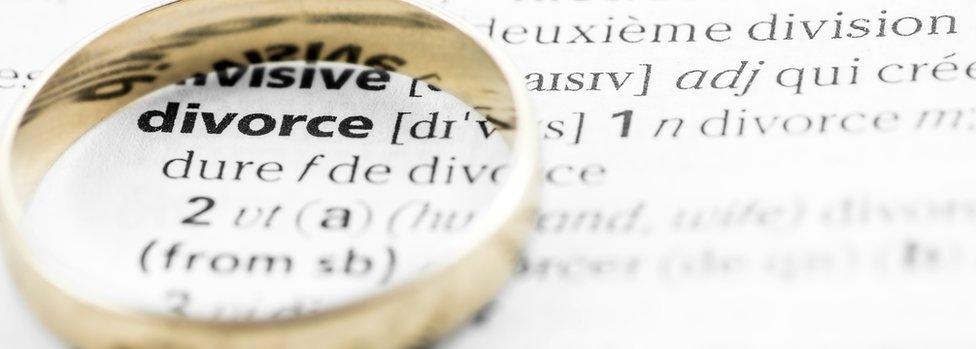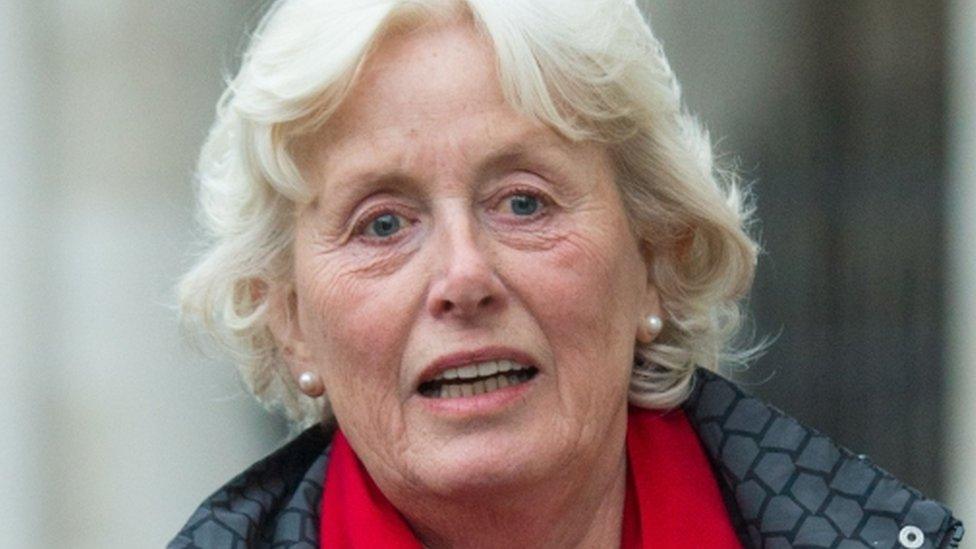The financial implications of divorce
- Published

The emotional upheaval of divorce can be difficult to deal with, but so too can the financial implications.
The process, were it to go all the way to a contested final court hearing, can in itself cost more than £30,000, money experts suggest.
On top of that, the settlement may come with its own financial pressures.
Lawyers and charities say that there are ways to keep the cost down, but that irreconcilable couples must also go into a divorce or dissolution of their civil partnership with their eyes open to the potential financial squeeze.
"For anyone embarking on this journey, there's no nice way to put this: it's likely to be a rough road ahead, which takes its toll both emotionally and financially," says Sarah Coles, personal finance analyst at investment platform Hargreaves Lansdown.
"Even with careful planning and a sensible approach, it won't be comfortable."
Research by insurer Aviva suggests 16% of couples who separate also buy a new home, spending an average of £144,600. Money matters take an average of 14.5 months to settle after a split, it adds.

More information:
Money Advice Service - divorce and money calculator, external
Citizens Advice - guide to ending a relationship , external
Gov.uk - money and property when a relationship ends, external
A do-it-yourself divorce
The most obvious way to keep down the cost of a divorce or dissolution is to come to an agreement without the use of solicitors or other professionals, particularly if it is an amicable split.
In Scotland, the do-it-yourself option is set out in law and called "simplified" divorce or dissolution. Only certain couples can use this procedure. For example, it is not available for those with children aged under 16.
In Northern Ireland, couples have to appear in person before a judge in either a county court or a High Court. However, they can appear in court as a "personal petitioner", without having to use a solicitor.
In England and Wales, couples can do it themselves or use a low-cost online service.
However, Katie O'Callaghan, of Boodle Hatfield lawyers, warned that anyone failing to get final, legal approval on their financial deal from a court - known as a consent order - can find themselves subject to a claim from their ex-partner in the years ahead.
"It is not enough for couples to agree between themselves on a handshake and think that this will protect them in the future," she says.
Avoiding solicitors
Legal costs can easily stack up, and even solicitors when first consulted will check whether separating couples have tried cheaper alternatives.
The most popular of these is mediation.
This is not relationship counselling. It can help people to agree on how to divide assets such as money, property, savings and investments. Legal aid is available to help those on low incomes with the cost.
Following mediation, a solicitor can draw up the consent order.

Couples with more complex issues, or who fail to agree, will go to a solicitor.
The costs involved can range from £2,000 to £3,000 for a negotiated financial settlement up to £30,000 plus VAT if a contested case goes through court, according to the Money Advice Service.
Couples in the process of a divorce or dissolution can apply to a court, at a cost of £255, for a financial order.
This covers areas such as a lump sum payment, ownership of a property, regular maintenance payments to help with children or living expenses, and a share of a partner's pension payments.
Ultimately, in many cases, a judge will decide how the couple's assets are divided between the couple.
The decision will be based on the length of the marriage or civil partnership, the ages of the parties involved, their ability to earn, their property and money, their living expenses, and their standard of living.
The roles played, such as breadwinners or primary carers will also be considered.
The judge will make arrangements for any children first, especially their housing arrangements and child maintenance, if there are not enough assets to go around.
There can be tax implications, external following these rulings.
Common issues
Ms O'Callaghan, of Boodle Hatfield, suggests that after a split it is important for couples to maintain the financial organisation in the household that they had prior to the separation.
So, for example, if the husband pays the mortgage, he should continue to do so. That is because keeping the same financial arrangements will make the court proceedings simpler.
She adds that courts have wide-ranging powers to find any hidden assets, so individuals should not squirrel those away, however acrimonious the split.
Individuals can also find themselves worse off than they expected if they cohabit with a new partner. If they are living together, the finances of the new partner can be taken into account during a divorce settlement with the ex-partner. If they are not cohabiting, then such finances will be ignored.
Ultimately, if a couple's finances are more complex, it is likely to cost more - in both time and money - to reach an agreement.
- Published18 October 2017

- Published11 August 2017

- Published24 March 2017
